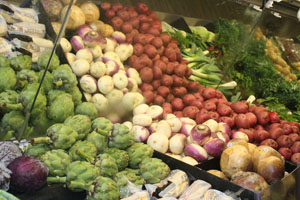Being a vegetarian seems like a daunting task. It complicates what you eat day in and day out, which makes something as simple as typical cafeteria choices out of the question. Senior Stephanie Chervenkov faces these challenges every day. Frequent questions such as why choose vegetarianism and what are the benefits don’t always have the same answers, but choosing vegetarianism is a personal health choice.
The Vegetarian Resource Group reports that in a 2010 poll of the American youth ages eight to 18, seven percent reported being vegetarian. That’s 1.4 million youth nationwide that do not eat meat. It is obvious that the youth are following the vegetarian fad, but what makes them want to begin in the first place?
Holly Alley, licensed dietician and nutrition specialist, writes in the article “Vegetarianism” that there are many reasons that people become vegetarians. “These may include religious, health, fad, economic, or moral reasons.”
Chervenkov decided to become a vegetarian when it was time to give up something for Lent this past year. “I’ve always wanted to be a vegetarian because I love animals and I know it’s healthier not to have meat in your diet. After Lent I decided to continue not eating meat and I haven’t ever since,” Chervenkov said.
While all vegetarians do not eat meat, vegetarianism has different categories. Ovo-vegetarians eat eggs, while lacto-ovo vegetarians eat dairy products and eggs. Lacto-vegetarians eat dairy products, and vegans eat only food from plant sources.
Chervenkov describes herself as a lacto-ovo vegetarian. “I eat eggs almost every day to get my protein. I’m really into organic and health foods, and I also love fruit and try to eat a lot of it every day,” Chervenkov said.
The main concern regarding vegetarianism, however, is whether or not people, especially youth, receive enough calories and nutrients in their diets. KidsHealth.org lists essential nutrients and the best food sources in which to find them. Vitamin B12, vitamin D, calcium, and protein can all be found in dairy products. Iron and zinc can be found in dried beans and whole grains. The most beneficial foods to look for when being a vegetarian are vitamin-fortified products.
If vegetarians have to worry about getting the right nutrients in their diet, how is it healthy and beneficial? The article “Vegetarianism” states that vegetarians have a lower incidence of heart disease because their diets are low in total fat, saturated fat, and cholesterol. There is also a lower incidence of high blood pressure, type two diabetes, and obesity due to decreased fat and increased fiber intake.
Vegetarian choices are not the easiest to make when faced with the cafeteria, though. “The school barely has any vegetarian meals and if they do, it’s usually very unhealthy. I try to bring small snacks like fruit throughout the day to keep me full and when I go home I eat an actual meal,” Chervenkov said.
Being vegetarian doesn’t mean that you completely give up all that you love eating. There are vegetarian options such as veggie burgers and other veggie “meat” products made of tofu. Not only that, but fruits and vegetables can be easily worked into your diet if you give them a chance and experiment. “When being a vegetarian you want to focus on eating more fruits and vegetables. It’s also a good idea to take daily vitamins, especially b vitamins that you’d get from meat,” Chervenkov said.
“Vegetarianism isn’t for everyone. If you try it out and it works for you, you have the benefit of feeling healthier in general and having more energy,” Chervenkov said.
Stephanie Meadowcroft is a Lifestyles Editor for The Patriot and jcpatriot.com.



